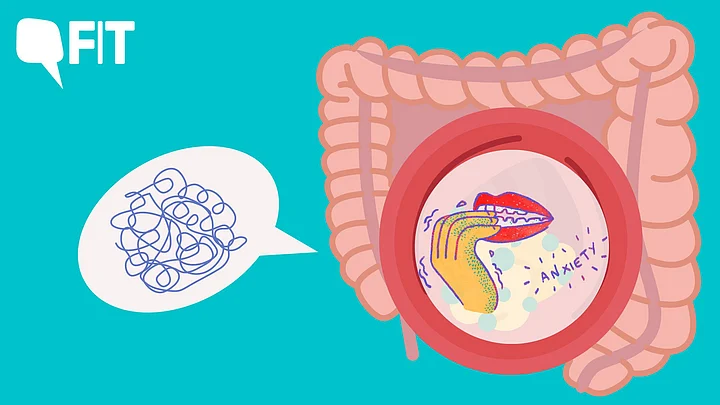What is anxiety disorder? A condition, with a wide range of symptoms, related to one's mental health that involves long-lasting signs of intense worry, uneasiness, nervousness, or fear.
But are all the symptoms associated with mental health only?
Not quite. Diarrhoea is one common physically manifested symptom which many might not be aware of. People can get diarrhoea when they have been going through something stressful or anxiety-inducing circumstances.
The connection between one's brain and gut microbiota can have a serious effect on bowel movement.
But fret not, it is possible to manage this pesky symptom of anxiety as well.
FIT speaks with Dr Sudeep Khanna, Senior Consultant, Gastroenterologist, Indraprastha Apollo Hospitals, New Delhi, and Dr Ayush Dhingra, Associate Director-Gastro, Max Hospital, Gurugram, to understand more about anxiety-related diarrhoea and how to tackle it.
What is anxiety diarrhoea? What causes it?
Anxiety is a mental health condition that can involve long-term patterns of significant worry, nervousness, or fearfulness. Intestinal problems are one of the most common symptoms of stress and anxiety.
Researchers have identified a connection between the gut and the brain. Like the brain, our intestine is full of nerves called the enteric nervous system, also referred to as the 'second brain.'
The enteric nervous system has the same type of neurons and neurotransmitters as those found in your central nervous system.
"This connection between the brain and gut affects our digestion, mood, and the way we think. The enteric nervous system lines our entire digestive system with more than 100 million nerve cells forming two layers. It runs from the esophagus to the rectum."Dr Sudeep Khanna, Senior Consultant, Gastroenterologist, Indraprastha Apollo Hospitals, New Delhi
The disturbance in the above mentioned gut-brain axis manifests in the form of physical symptoms, including diarrhoea, nausea, or constipation.
What is the relationship between anxiety and bowel movement? Can anxiety trigger IBS?
Dr Sudeep Khanna says "It's not clear how stress, anxiety, and irritable bowel syndrome (IBS) are related, or which one comes first. But studies show that they can happen together."
The most common mental ailment people with IBS have is generalised anxiety disorder. Our thoughts, feelings, and the response to environmental triggers lead to a release of chemicals in our brains.
These chemicals affect different processes in our bodies.
"With IBS and anxiety, the theory is that when you feel anxious, your body releases stress-related chemicals to your gut. The result is abdominal pain, a change in your gut bacteria, and abnormal bowel movements."Dr Sudeep Khanna, Senior Consultant, Gastroenterologist, Indraprastha Apollo Hospitals, New Delhi
Although there is much evidence to show that psychological problems like anxiety disorder don't cause digestive disorders, people with IBS may be more sensitive to emotional troubles.
"Strong emotions like stress, anxiety, and depression trigger chemicals in the brain that turn on pain signals in your gut and may cause your colon to react," Dr Khanna says.
How long does stress diarrhoea last?
Stress-related diarrhoea normally subsides as soon as the stressful episode is gone. But with certain patients, who have anxiety neurosis, the gut brain axis is perpetually stimulated, leading to an increase in bowel movement manifesting as diarrhoea.Dr Ayush Dhingra, Associate Director-Gastro, Max Hospital, Gurugram
This condition, if persistent for more than 1-2 years, collectively is what translates into irritable bowel syndrome (IBS), where the gut is inherently irritated.
Moreover, because of poor eating habits as well as the inability to cope up with stress, the episodes of diarrhoea can be recurring.
Does it need clinical treatment? If yes, then when should one see a doctor?
If anxiety is the underlying cause of diarrhoea, minimising anxiety may help reduce symptoms. Here's how it can be done:
Avoiding foods that may contribute to intestinal upset: Avoid consuming caffeine, spicy foods, and foods containing lactose. Other food restrictions may also help.
Psychotherapy: Therapy can help you identify anxiety and learn techniques to manage and reduce it. Therapists may use approaches such as mindfulness and cognitive behavioural therapy (CBT).
Complementary health: Stress-relieving and relaxation techniques like meditation, yoga, tai chi, and acupuncture can also help. Hypnotherapy may also help reduce symptoms such as stomach upset, bloating, and stomach pain in those with IBS.
Doctors may also prescribe medications to treat diarrhoea.
Antispasmodics: These medications reduce the frequency of contractions in the muscles in the intestines. As a result, the stool does not move through the intestines as quickly.
But keep in mind - DO NOT SELF MEDICATE.
What are the dietary and lifestyle changes one needs to implement in their lives to manage it properly?
Lifestyle and dietary changes could also help you manage symptoms of anxiety. Some diet-related tips include:
Include some form of protein in your breakfast. This can help you feel fuller for longer and help keep the blood sugar steady.
Eat complex carbohydrates. Carbohydrates are thought to increase the amount of serotonin in the brain, which has a calming effect. Eat foods rich in complex carbohydrates, such as whole grains like oatmeal, quinoa, whole-grain bread, and whole-grain cereals.
Drink plenty of water and stay hydrated. Even mild dehydration can affect your mood.
Pay attention to food sensitivities. In some people, certain foods or food additives can cause unpleasant physical reactions.
Try to eat healthy, balanced meals. Healthy eating is important for your overall physical and mental health. Eat lots of fresh fruits and vegetables, and don't overeat. It may also help to eat fish high in omega-3 fatty acids, such as salmon, on a regular basis.
Decrease caffeine intake.
Get regular exercise.

